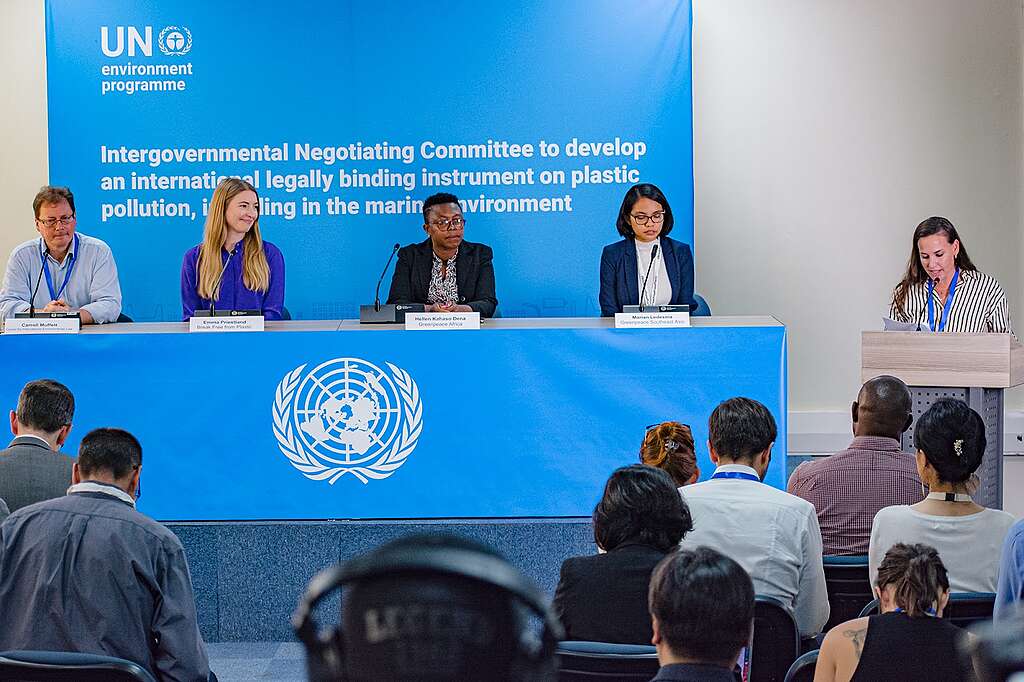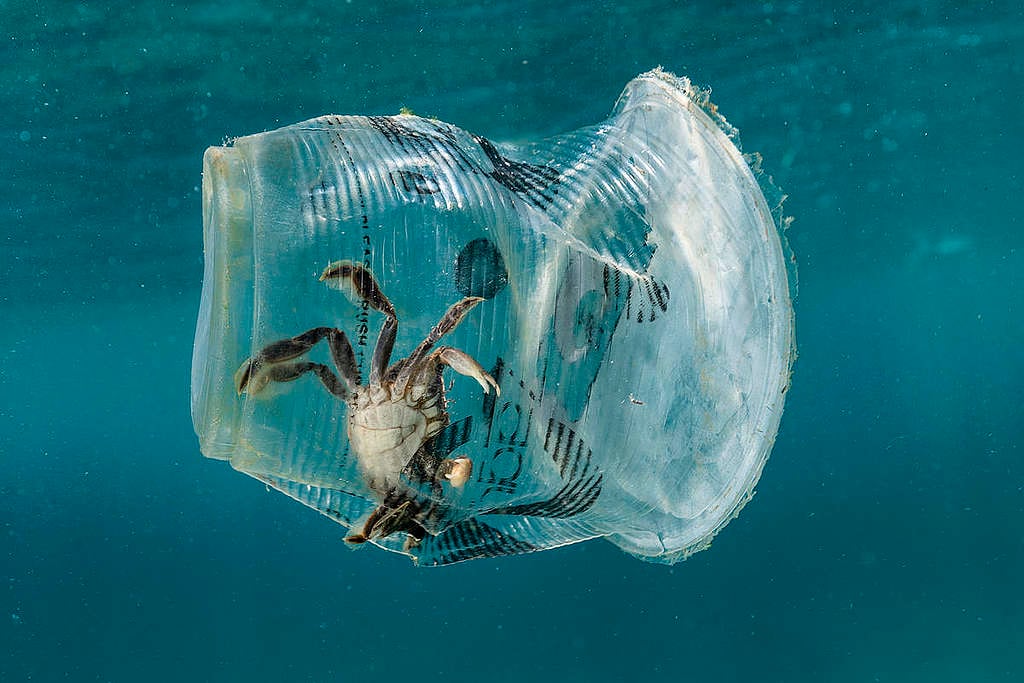Last week, as I attended one of the most historic events as world leaders came together to negotiate a Global Plastics Treaty, made me realise that I am not just a visitor from South Africa to Kenya, I am an activist on African soil – representing the millions of voices around the world calling to end the age of plastic!
As I stood in front of the UN headquarters, the excitement was tangible and the energy around me was contagious. This is the moment that world leaders, ministers, country representatives and civil society organisations gathered to participate in the third meeting to negotiate a Global Plastics Treaty.
I am Natanya from Greenpeace Africa – an activist, a supporter and part of this once in a lifetime moment.
In case you missed it, here’s what happened.
A march to end the age of plastic in the streets of Nairobi
Hundreds of climate activists gathered at National Museums, Kenya on Saturday 11 November 2023 to march through the streets of Nairobi.
Traffic came to a standstill as the crowd, led by youth climate activists and a marching band, echoed chants in support of a strong and ambitious Global Plastics Treaty. The movement is demanding that leaders champion drastic reduction in plastic production. For the sake of our collective future.
The Perpetual Plastics Machine: an art installation to illustrate the destructive lifecycle of plastics
After becoming the iconic image of INC2 in Paris in May, the Perpetual Plastics Machine travelled all the way to the Gigiri Courtyard in Nairobi to highlight the whole lifecycle of plastics.
The art installation, created by Greenpeace together with award-winning artist and activist Ben Von Wong, was displayed to raise awareness of our demands to reduce plastics production by at least 75% by 2040 with the help of Greenpeace Africa’s volunteers.
Press conference
We kicked off the first day of the Global Plastics Treaty (INC3) negotiations with a press conference at UN Environment Programme headquarters in Nairobi together with our allies from the Break Free from Plastic movement.
Panelists included Marian Ledesma (Greenpeace South East Asia) and Hellen Dena (Greenpeace Africa), together with Emma Priestland (Break Free From Plastic) and Caroll Muffet (Centre for International Environmental Law). This event allowed us to push our demands for at least 75% reduction of production and displayed our video that features over thirteen celebrated activists, athletes and actors from around the world calling to end the age of plastic.
At the press conference, my colleague Hellen Kahaso Dena, head of the pan-African plastics project for Greenpeace Africa, pointed out that with African cities and coastlines drowning in waste, African leaders don’t have to look far to understand that only a legally binding global treaty on plastics, which will put an end to plastic pollution by phasing out plastic production, will solve the plastic pollution crisis. The negotiations on this treaty are an opportunity to stop the big polluters, reduce plastic production and protect the human rights of Africans and our planet.
Greenpeace volunteers from 13 countries in action against plastic pollution
Greenpeace volunteers sent a clear message to world leaders calling for an ambitious Global Plastics Treaty that cuts plastic production and use by at least 75% by taking actions in thirteen countries. We need a strong plastics treaty that turns off the plastics tap and finally, end the age of plastic.
Une publication partagée par Greenpeace International  (@greenpeace)
(@greenpeace)
What did we ask for during these negotiations and what happened?
The conversation so far.
We have fought for a strong Global Plastics Treaty that takes into account the entire life cycle of plastics, from production to disposal. The best available modeling, including the recent report from Systemiq/the Nordic Council of Ministers, shows us that we cannot address plastic pollution across the lifecycle without supply-side controls on plastic production. Since there are no projections that show waste management capacity ever catching up with current projections on plastic production, reduction in supply is the only long-term solution.
Although measuring plastic pollution can be complex, there is now a huge amount of data available on the harms caused by the plastic life cycle, from production emissions, to human health impacts, to chemical composition. This is more than enough data to justify a ‘start-and-strengthen’ approach to control measures- ensuring they are as legally and globally-binding as possible and appropriate and using the Conference of Parties to ratchet up ambition as more science becomes available.
This latest round of negotiations has once again shown that the fossil fuel and petrochemical industries are fiercely opposed to the people and planet-saving measures in the Global Plastics Treaty. Their growing presence in the negotiations is highly revealing.
An analysis conducted by Center for International Environmental Law (CIEL) and supported by Greenpeace revealed that 143 fossil fuel and chemical industry lobbyists gained access to the third session of the Intergovernmental Negotiating Committee (INC-3) to negotiate for a Global Plastics Treaty.
 Press conference by the Greenpeace delegation at the site of negotiations for a global treaty on plastics in Nairobi, Kenya. © Natanya Harrington / Greenpeace Africa
Press conference by the Greenpeace delegation at the site of negotiations for a global treaty on plastics in Nairobi, Kenya. © Natanya Harrington / Greenpeace AfricaIt was a disappointing third session for the Intergovernmental Negotiating Committee (INC3) in the fight against plastic pollution, biodiversity loss and climate change. Through all of the negotiations, low ambition coalition (LAC) countries were clearly trying to water down an ambitious treaty by narrowing its scope to focus solely on downstream measures.
The Zero Draft released by the Chair of INC in September 2023, was agreed upon by the majority of the countries to provide a useful basis for the negotiations, despite attempts by LAC countries to halt the negotiations.
The negotiations took a new turn when calls for the deletion of key provisions were made, including primary plastic polymers, chemicals and polymers of concern, problematic and avoidable products, and introduction of new alternative text proposals. These attempts were made to water down the ambitious treaty to focus on downstream measures, and prolong the negotiations with the limited time available.
The High Ambition Coalition (HAC), including the Africa Group and Small Island Developing States (SIDS), fought bravely until the end to lead the fight against negotiators removing these provisions and highlighting the need for action at all levels in the plastics value chain.
The next round of negotiations will be key in ensuring we secure the treaty we need to tackle the plastic crisis. Our delegation will be in Ottawa, Canada to ensure that all of your voices are heard.
For the health of the planet, biodiversity, and overall well being, we urgently need a strong and effective Global Plastics Treaty.
Natanya Harrington is Head of Digital Engagement and Community Manager at Greenpeace Africa.

Ask world leaders to support a strong global plastic treaty that addresses the whole life cycle of plastic.

 1 year ago
252
1 year ago
252

